- Home
- William Miller
Noble Vengeance
Noble Vengeance Read online
Noble Vengeance
william miller
Contents
Chapter 1
Chapter 2
Chapter 3
Chapter 4
Chapter 5
Chapter 6
Chapter 7
Chapter 8
Chapter 9
Chapter 10
Chapter 11
Chapter 12
Chapter 13
Chapter 14
Chapter 15
Chapter 16
Chapter 17
Chapter 18
Chapter 19
Chapter 20
Chapter 21
Chapter 22
Chapter 23
Chapter 24
Chapter 25
Chapter 26
Chapter 27
Chapter 28
Chapter 29
Chapter 30
Chapter 31
Chapter 32
Chapter 33
Chapter 34
Chapter 35
Chapter 36
Chapter 37
Chapter 38
Chapter 39
Chapter 40
Chapter 41
Chapter 42
Chapter 43
Chapter 44
Chapter 45
Chapter 46
Chapter 47
Chapter 48
Chapter 49
Chapter 50
Chapter 51
Chapter 52
Chapter 53
Chapter 54
Chapter 55
Chapter 56
Chapter 57
Chapter 58
Chapter 59
Chapter 60
Chapter 61
Chapter 62
Chapter 63
Chapter 64
Chapter 65
Chapter 66
Chapter 67
Chapter 68
Chapter 69
Chapter 70
Chapter 71
Chapter 72
Chapter 73
Chapter 74
Chapter 75
Chapter 76
Chapter 77
Chapter 78
Chapter 79
Chapter 80
Chapter 81
Chapter 82
Can’t wait for more Jake Noble?
Did you enjoy the Book?
About the Author
Noble Intent
Chapter One
Chapter Two
NOBLE VENGEANCE
Copyright © 2017 by William Miller.
All rights reserved. Printed in the United States of America. No part of this book may be used or reproduced in any manner whatsoever without written permission except in the case of brief quotations embodied in critical articles or reviews.
This book is a work of fiction. Names, characters, businesses, organizations, places, events and incidents either are the product of the author’s imagination or are used fictitiously. Any resemblance to actual persons, living or dead, events, or locales is entirely coincidental.
Book and Cover design by www.LiteraryRebel.com
First Edition: May 2017
Every novel is a labor of love. This one is no exception. I could not have done it without all the love and support of my family and friends. Special thanks to Gary Clairy for valuable insight and feedback, and to Robin for doing her best to catch my many, many typos.
“From Hell’s heart, I stab at thee.”
~ Herman Melville
Chapter One
Jesús Torres had roughly an hour to live. He entered the recently remodeled Buenavista railway station a few minutes after one o’clock. A summer heatwave was turning the streets of Mexico City into rivers of shimmering asphalt. Inside the station, the air conditioners worked overtime. A voice announced arrivals and departures over a grainy loud speaker. Sound echoed in the cavernous hall. Torres passed the ticket booths and terminals packed with sweaty travelers, to a row of long-term storage lockers. He dug a USB drive from the pocket of his faded denims, opened locker 314, glanced around the bustling terminal, then hid the thumb drive inside, using the narrow ledge above the door hinge. He closed the locker, removed the key and gave it a tug to be sure it was locked.
Next he located a row of payphones near the restrooms. He took one look at the bulky, orange card readers and his lips peeled back from clenched teeth. For someone in his line of work, a credit card is like a homing beacon.
He stood there in silent debate. The only other person using the payphones was a middle-aged woman. She kept waving a hand in the air, sighing, rolling her eyes.
“Screw it,” Torres said and reached into his back pocket for his wallet. He picked up the receiver, pushed his card into the slot and then waited for a dial tone.
“Hola.” Machado said with the raspy baritone that comes from a lifetime of heavy drinking.
“It’s me,” Torres said in Spanish. “You have something I want.”
“Sí, amigo. She has a lot of spirit.”
Torres heard a scream in the background. His heart squeezed inside his chest. His knuckles turned white. “Cabrón!”
The woman on the next phone over shot him a dirty look.
“My men have been entertaining her for days,” Machado said. “I was starting to wonder if you would ever call.”
Torres squeezed his eyes shut. If she could scream, she was still alive. That’s all that mattered. Machado was trying to push his buttons, force him to make a mistake. He told himself to breathe. She was still alive and he had a chance to save her.
“Let’s trade,” Torres said. “Me for the girl.”
“I’m more interested in the files you stole from me.”
“That’s part of the bargain,” Torres assured him. “Turn her loose and you get the files. Don’t, and they go public.”
“We pay a terrible price for the women we love,” Machado chuckled. “When and where?”
Fighting to keep his voice steady, Torres said, “The airfield. One hour. Bring the girl.”
“We have a deal,” Machado said.
Torres slammed the receiver and walked out of the train station into the blazing midday sun. His eyes narrowed against the light. He clutched the locker key in his fist. First thing he needed was a post office.
Chapter Two
Gone were the days when cartels used small, single-engine airplanes to fly drugs into America under the cover of darkness. During the eighties, when the cocaine business was run out of Colombia, plane or boat was the most efficient means of moving product. Now that cartels had relocated to Mexico, it was cheaper to load a few hundred kilos onto the backs of immigrants and march them across the border, making airplanes obsolete.
However, planes still provide the best means of travel for paranoid drug tsars. Armored convoys, no matter how well protected, can be blown up by roadside bomb—a tactic employed frequently by rival gangs. Once airborne, the only thing that can bring a plane down is a surface-to-air missile. For that reason, Cessnas and helicopters are the transportation of choice for fashionable drug smugglers.
Torres pulled off the road well in advance of the airfield. He was in a dust-covered Range Rover with balding tires. The air conditioning was on full blast. Heat made the horizon shimmer. The Range Rover rumbled over hardscrabble earth dotted with stunted trees. Torres drove around the east side of the runway where a corrugated steel hangar abutted a security fence topped with razor wire. He cut the engine and raised a pair of binoculars.
In the passenger seat was an SVD Dragunov rifle with a scope and a 9mm Berretta. He had built a silencer from a glass Coca-Cola bottle packed with cotton and had fixed it to the Berretta with duct tape. The handgun looked comical with a Coke bottle duct taped to the barrel, but To
rres knew from experience the homemade sound suppressor would work. The glass and cotton trapped the expanding gasses and dampened the report. It wasn’t perfect, though. He would get one, maybe two, shots. In order to fit the bottle over the barrel, he had been forced to file down the front sight, which made aiming tricky business. If he had to use the Berretta, he would need to be up close and personal.
Through the binoculars, he counted six cartel soldiers armed with AK-47s, milling around the front gate. They knew he was coming and they’d be keyed up for a fight, but they were teenagers with automatic weapons. Machado hired school kids, gave them guns, and put them to work as enforcers on the streets of Mexico. Most of the boys lived short, brutal lives. The ones that survived to adulthood grew into stone-cold killers. Those were the ones that worried Torres.
He tossed the binoculars into the floorboard. They landed with a thump. He climbed out, slung the Dragunov sniper rifle over his shoulder and took the silenced Berretta. A hot wind seared across the barren landscape like the breath from an open oven. Torres mopped sweat from his brow. His boots kicked up small clouds of dust. He draped the floor mat over his forearm, shouldered the rifle, gripped the Berretta in both hands, and made his way between stunted trees to the perimeter fence.
He took a knee behind a thorn bush and waited. He was watching for foot patrols. If the teenage pistoleros caught him in the open, they would cut him down with their AK-47s. The hangar, its powder blue paint gleaming under the sun, lay directly ahead. Fifteen meters of open ground separated him from the fence.
He watched the second hand on a knock-off Rolex with the gold plating flaking off. Thirty seconds. Sixty seconds. No foot patrols. His training told him to wait ten minutes at the very least, but he didn’t have the luxury of time. He needed to be inside the hangar before Machado’s men showed up with Alejandra.
Torres broke cover, running in a crouch with the silenced Berretta leading the way. The fence was eight feet tall. Torres, only five foot seven, had to jump to drape the floor mat over the razor wire. It sounded like the brass section of an orchestra falling down on stage. He wedged the toe of his boot into one of the diamond-shaped openings and hauled himself up. The Range Rover’s floor mat protected him from the razor wire. Torres dropped down on the other side and pulled the carpet down. The brass section took another tumble.
He dropped the floor mat in the dirt and moved around the building to a side door. Apart from the main hangar doors, this was the only other way in. A collection of cigarette butts and crumpled beer cans littered the ground.
Torres tried the knob, found it locked and banged on the metal door with an open palm. He heard the lock turn and the door swung open. The hangar attendant, a short man with a sagging gut and a gun tucked in his waistband, stuck his head out. “Qué?”
Torres leaned around the door and fired two rounds. Empty shell casings leapt through the air, trailing smoke, to land among the cigarette butts. The hangar attendant rocked back on his heels with a pair of dime sized holes in his forehead and broken glass in his face. His body teetered for a moment and then fell. He hit the concrete floor with a flat whomp. The first round had exploded the bottom of the bottle. The second made a loud clap.
A sixty-five million dollar Gulfstream and a smaller jet helicopter took up most of the hangar space. Skylights reflected off their gleaming white fuselages. There was a large fuel tank on one side of the hangar and a small office on the other. The smell of jet fuel hung in the air.
Torres closed the door, locked it, and then went to a small window in the main hangar doors which looked out toward the front gate. Machado’s hirelings loitered in front of the chain link fence, smoking cigarettes and telling jokes. He could knock down all six from this distance, but he would need a stable shooting platform.
He scanned the hangar bay, spotted a large red tool chest and wheeled it across the floor. It was constructed of heavy gauge aluminum and filled with tools; it should stop a few bullets. Next he located a stepstool that the mechanics used to work on the engines and placed that in front of the big tool chest.
Torres laid the Berretta atop the chest, climbed the step-stool and shrugged the Dragunov off his shoulder. The weapon was chambered in 7.62mm with a ten-round magazine. He flipped down the bipod legs, settled the stock into his shoulder and adjusted his vision through the scope.
His front teeth felt like they were electrified and his heart was trying to beat its way out of his chest. He exhaled, and focused on his breathing.
A dirt-splattered BMW rolled up to the front gate, pulling a train of dust. The cloud blotted out the car momentarily before the wind pulled it apart. Through dark window tint, Torres counted five heads. Two in front. Three in back.
Chapter Three
Torres watched as the driver’s side window buzzed down and Santiago ordered the guards to open the gate. Machado had not come himself. Santiago was his second-in-command: a tattooed ex-cop who wore gold-tinted aviators and slicked back hair. One of the cartel soldiers shouldered his rifle, brought out a set of keys, and moved to the padlock.
Torres centered the crosshairs, exhaled, brushed the trigger. The Dragunov kicked. The window exploded out of its frame. The pistolero pitched over onto the tarmac, dead.
The others turned and unleashed a hail storm of lead. The sound split the air like a swarm of angry hornets looking for something to sting. Bullets chewed through the corrugated steel doors and impacted the rolling tool chest with heavy metallic thwaps. Torres ducked his head and waited.
Santiago leapt out of the BMW waving his arms in the air. “Hold your fire! Hold your fire! You’ll ignite the tanks!” He finally yelled loud enough to be heard over the rattle of AK-47s. “I said hold your fire!”
The guns tapered off. The sound rolled away over the flat landscape like retreating thunder. Smoke drifted from rifle barrels. The hired guns kept their weapons trained on the hangar. A few were smart enough to spread out. One took a knee, making himself a smaller target, not that it mattered.
Santiago hunkered down behind the car and yelled, “Diaz! I knew you were federales from the start. Who do you work for? The Americanos?”
Torres took a burner cell from his pocket and dialed Santiago’s number. He put the phone on speaker, placed it on top the tool chest next to the Berretta and centered his crosshairs on the top of Santiago’s head, just visible over the hood of the car. It rang a dozen times before Santiago realized his phone was vibrating in his pocket. “What?”
“I want to see the girl,” Torres told him.
Santiago took the phone away from his ear and barked a command.
The back door opened. Ramone, a bulldog of a man with a barrel chest, hauled Alejandra out and dumped her, naked, by the side of the road. Her black hair hung in tangles. Dried blood caked one side of her face.
Ramone hurried back around the car and out of sight.
Santiago said, “Like what I did to her face?”
Torres trained his scope on her for a closer look.
The bastard had cut her. A deep slash ran down the right side of her face from her eyebrow to her chin. Bruises covered the other half. Her lips were busted and her nose was broken.
Torres turned his face away. A vein pulsed in his forehead. Tears blurred his vision. He had screwed up. He should have cut her loose when he realized he was falling for her, but she was under his skin, like a melody that you can’t get out of your head. He dashed away the tears and trained the scope on the pistoleros at the gate. It was an effort to keep his voice under control. He said, “Order your men out of the car.”
“Everybody out of the car,” Santiago said.
They piled out, left the doors standing open and took cover in a shallow ditch on the opposite side of the road.
“Give the phone to Alejandra,” Torres said.
Santiago tossed the cell over the hood. It landed in the dirt. She crawled to it on hands and knees. “Diaz?”
“Alejandra,” Torres said. “Get in the car a
nd get out of here, baby.”
She shook her head. “N-no. Not without you.”
“Listen to me,” Torres said. “I’m not coming with you, baby. Now get in the car and drive.”
“No,” Alejandra moaned.
“Santiago!” Torres yelled through the window. “You want me? Put the girl in the car!”
Santiago jogged around the car, grabbed Alejandra by the hair and hauled her to her feet. She shrieked. He dragged her around the front bumper and shoved her into the driver’s seat.
Torres’ throat cramped. He swallowed the lump and yelled. “Alejandra go!”
Crying, she shifted the car into reverse and stamped the gas pedal. The BMW shot backwards, kicking up a cloud of dust.

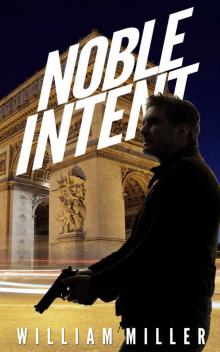 Noble Intent
Noble Intent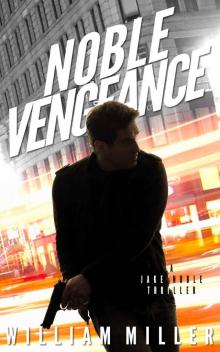 Noble Vengeance
Noble Vengeance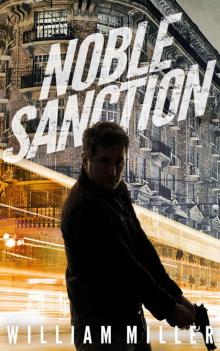 Noble Sanction
Noble Sanction Gloucester Crescent
Gloucester Crescent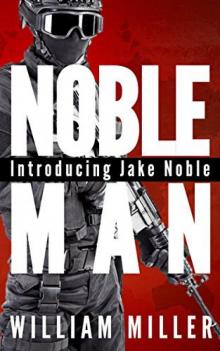 Noble Man
Noble Man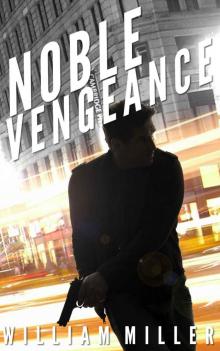 Noble Vengeance (Jake Noble Series Book 2)
Noble Vengeance (Jake Noble Series Book 2)